- There are no more items in your cart
- Shipping Calculated at checkout
-
Sub-Total (inc. VAT)
£0.00
Need Help?
Cladding Primers
Advanced cladding primers designed to prepare and protect cladding surfaces for painting over with a suitable cladding topcoat. Suitable for metal, plastic, and wood, these primers enhance adhesion for topcoats, providing a durable and corrosion-resistant base. Essential for commercial and industrial settings, they shield cladding from weathering and environmental damage, extending the lifespan of the structure. Ideal for new installations and refurbishments, Cladding Primers ensure a strong foundation for any cladding system.
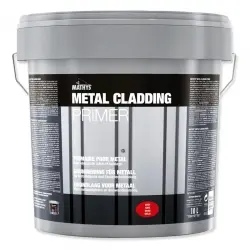
Rust-Oleum Mathys Metal Cladding Primer
Available in white, light and dark grey. For use on metal substrates including bare, blasted, galvanized, and plastisol-coated surfaces. Can be overcoated with a recommended cladding paint such as Metal Cladding Topcoat. Anti-corrosive primer. Rapid curing. Water-based and low-VOC. Overcoatable in 1 hour. Provides excellent corrosion...
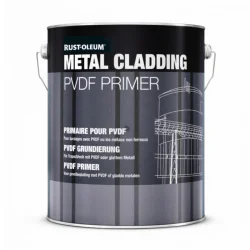
Rust-Oleum PVDF Primer
Available in matt grey. Super adhesion primer for cladding and new or aged PVDF/PVF2 surfaces. For galvanised steel, zinc, aluminium, and hard plastics. Tack-free in 30 minutes. Ideal under Mathys Metal Cladding Topcoat. Professional use only.
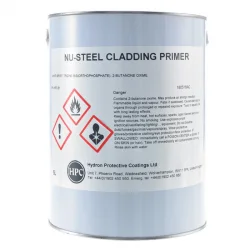
Hydron Nu-Steel Cladding Primer
Single pack, modified acrylic primer for use with Nu-Steel Cladding Paint. Specifically developed for application to Plastisol and polyester coated steel and aluminium cladding. Provides excellent resistance to UV attack. For use on properly prepared cladding and prefabricated buildings, architectural steelwork, and industrial...
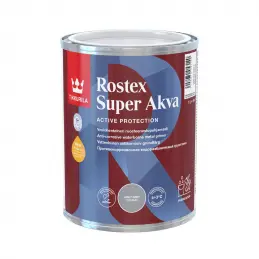
Tikkurila Rostex Super Akva
Completes waterborne coating system treating metal sheeted roofs and other metal surfaces from bottom to top. Use waterborne Panssari Akva Roof Paint or Luja Finishing Paint in interior use as a topcoat. Examples of use includes metal-sheeted roofs, water channels, cinder sheets, other interior or exterior metal structures. For...
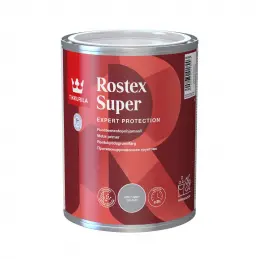
Tikkurila Rostex Super Metal Primer
For priming steel, zinc-coated steel and non-slip aluminum surfaces subject to heavier stress than usual, when the adhesion of normal alkyd primers will not be sufficient or would take too long to dry. Also suitable for copper, brass, stainless steel, pural, polyester, acryl, and obsolete PVC-coated steel sheets. Can be used as a primer for...
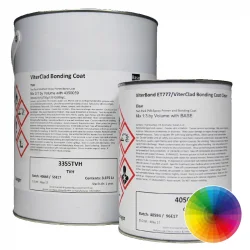
Axalta ViterClad Bonding Coat
Modified 2 pack epoxy adhesion and stabilising primer in 350+ colours, specially formulated for the maintenance and repair of architectural cladding. Recommended for the maintenance of Corus Colorcoat HP200 cladding Specially formulated for adhesion to stainless steel, carbon steel, galvanising, aluminium, copper, brass and PVF2, silicone...
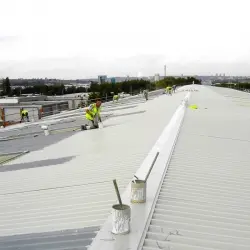
Tor Raincoat APA
Single pack coating for use in conjunction with Raincoat roof coatings and cladding finishes over PVDF and other plastic coated substrates. Adhesion promoting. Anti corrosive intermediate coating. Based on a specially modified acrylic resin system containing anti-corrosive pigments and inert extenders.
Need Help?
Need Help?
Cladding Primers are essential coatings that form a crucial preparatory layer on cladding surfaces, ensuring optimal adhesion for subsequent topcoats. These primers are specially formulated for various substrates, including metal, plastic, and wood, providing enhanced corrosion resistance and long-term durability. Their application is vital in commercial and industrial settings where cladding systems are exposed to harsh environmental conditions. By offering protection against weathering and extending the lifespan of the cladding, these primers contribute to reduced maintenance requirements.
Understanding Cladding Primers
Cladding Primers are specialised coatings designed to prepare cladding surfaces for the application of topcoats. They serve as an intermediary layer that enhances the bond between the substrate and the finish coat, ensuring a durable and long-lasting finish. These primers are formulated to shield the underlying material from corrosion, UV damage, and other environmental factors, significantly improving the overall performance and appearance of the cladding. By using a Cladding Primer, the integrity of the cladding system is preserved, ensuring that it remains in optimal condition for years to come.
Applications and Benefits of Cladding Primers
Cladding Primers are suitable for a wide range of substrates, including metal, PVC, and timber cladding. They provide a consistent surface that significantly improves the adhesion of subsequent paint layers. In industrial and commercial environments, cladding often faces exposure to harsh weather, chemicals, and physical wear. The use of a primer creates a protective barrier, extending the life of the cladding and reducing the need for frequent maintenance and repairs. This not only ensures a more durable finish but also offers long-term cost savings.
Suitable Substrates and Protection Mechanisms
These primers are versatile and can be applied to various cladding materials such as aluminium, galvanised steel, plastic, and wood. When applied to metal cladding, the primer acts as a shield against rust and corrosion, preventing the metal from deteriorating over time. For plastic and wood cladding, primers help to seal the surface, preventing moisture ingress, and ensuring a smooth and even finish for the topcoat. The use of a suitable Cladding Primer is especially important for substrates prone to weathering and environmental stressors, ensuring that the cladding remains protected and visually appealing.
Frequently Asked Questions
Can Cladding Primers be applied to surfaces that have been painted before?
Yes, Cladding Primers are suitable for previously painted surfaces. However, proper surface preparation of cladding, such as cleaning and sanding, is essential to ensure effective adhesion.
Are Cladding Primers compatible with all cladding materials?
Most Cladding Primers are formulated to be versatile and can be used on various cladding materials. It is important to verify compatibility with the specific material being used by consulting the product data sheet.
What is the recommended drying time before applying the topcoat?
The drying time can vary depending on the product formulation and environmental conditions. Always refer to the product data sheet for specific drying times to ensure optimal application.
Do these primers offer corrosion resistance for metal cladding?
Yes, many Cladding Primers are designed to provide corrosion resistance, making them ideal for use on metal cladding. They form a protective layer that helps to prevent rust and extend the life of the cladding.
Is it necessary to use a primer on new cladding installations?
Using a primer is highly recommended for new cladding installations. It not only ensures better adhesion for the topcoat but also offers additional protection against environmental factors, enhancing the longevity and performance of the cladding system.
For detailed advice on product selection and compatibility with specific cladding materials, contact the technical support team.
